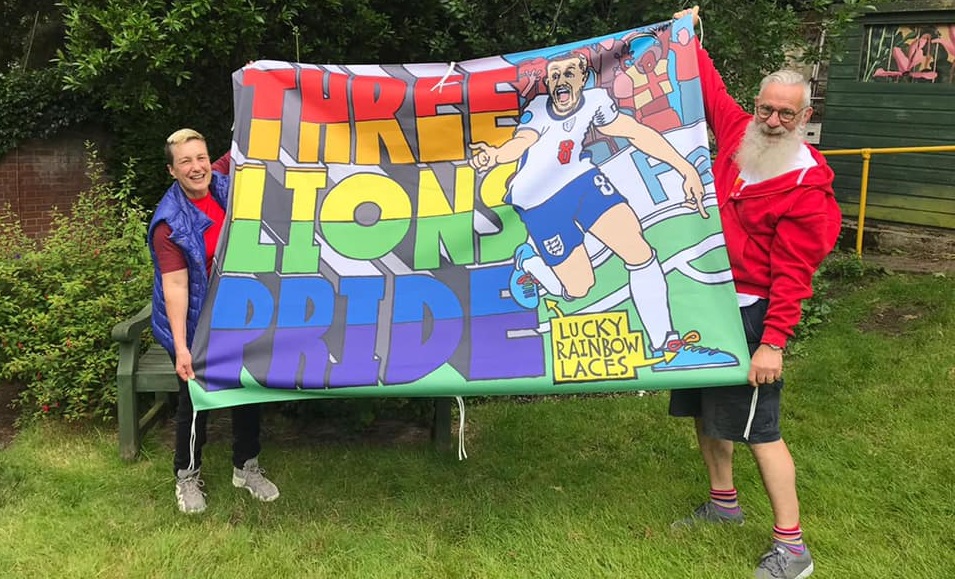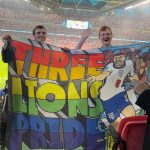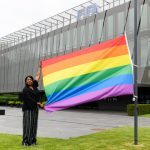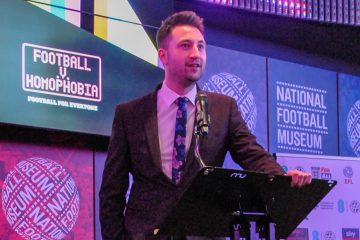‘Eng-clusion’ effect at Euro 2020 has helped make the nation feel whole again

A tournament in Pride Month, with rainbows on flags, armbands and laces, and the unbridled joy that only inflatable unicorns can bring… was this inescapably, unforgettably, a queer-friendly Euros? Is England for everyone? And what happens next?


Jon Holmes is the founder and lead of Sports Media LGBT+.
While the smiles of England supporters have grown ever wider during Euro 2020, many fans in Scotland, Wales and Northern Ireland will have been grimacing.
The prospect of the tournament concluding in a win for the Wembley hosts isn’t universally appealing across these British Isles.
That’s as it should be – rivalries bringing extra edge to football’s rollercoaster of ups and downs. However, at these Euros, a quick glance at the iTunes chart suggests the other Home Nations have ended up helping England, for it would be remiss to skip over their contributions to our party playlist.
Just consider this summer’s songbook. Atomic Kitten’s ‘Whole Again’ was originally co-opted by Celtic fans to acclaim Mikael Lustig; Wales fans chanted ‘Please Don’t Take Me Home‘ as they toured around France en route to the Euro 2016 semis; and both ‘Sweet Caroline’ and ‘Freed From Desire’ have long been belted out by Northern Ireland’s Green and White Army. Now they have all become England anthems alongside old favourite ‘Three Lions’.
You might think anyone can spin a record or two but there’s an art to crowd-pleasing – like Gareth Southgate, Wembley DJ Tony Perry has consistently got it right with his selections. And whether it’s a uniting tune or a particular lyric, the music is making us feel even more connected to our heroes. Having been socially distanced for so long, we’re now reaching out and touching hands once again, whether in the stadium, the pub, or with friends and family in our front rooms.
The official tournament song, Martin Garrix’s ‘We Are The People’, also has a line that seems apt – “We’ll build it better than we did before”. There’s a definite reconstruction happening here, not just of what it means to be a football fan, but the way in which we’re all coming together as individuals to create something so much bigger than ourselves. Looking around the crowd at the Germany and Denmark games, these were faces in the mirror being held up to our country – what Stormzy, Dave and Ian Wright know to be ‘Modern England’.
And amongst these many diverse groups, the ‘Eng-clusion’ effect is embracing our LGBTQ+ community too – this specific demographic of supporters who still believe, who want to stay here and drink all the beer, who are still turned on (if you will) by ‘the one’ wearing the waistcoat, but who are also lesbian, gay, bi, and trans.
Of course, we’ve always been part of the fanbase – you could even say that we understand better than most how jokes and sneers wear you down through the years. However, now we find ourselves savouring an atmosphere that’s more welcoming. This time, we’re not only invited, but we might even get to dance Nobby’s dance without worrying about who’s watching.
My first Euros experience following England was 21 years ago, the chastening defeat in Charleroi to Romania, preceded by a win over Germany that is remembered more for water cannons and flying furniture in the town square than Alan Shearer’s goal. Attending away games in the following years in Cologne, Barcelona, Zagreb and Geneva, I’d occasionally witness boisterousness escalate into bloody violence – sometimes the supporters were to blame, sometimes the local police. I was rarely proud to be English, and feeling like I didn’t fit in with fellow fans would often leave me awkward and isolated. By the time I had hit 30, the trips abroad had lost their appeal. It wasn’t for me.

It’s why the current efforts being made by England around belonging mean so much. The approach is multi-layered and multicultural – personal messages from players, viral memes, taking a knee, standing for something. Jordan Henderson deciding to wear Rainbow Laces and also tweeting that ‘football is for everyone no matter what’ delivers such a powerful statement alongside the symbolism. Artwork by David Shenton of Henderson’s goal celebration against Ukraine now features on a new banner from England fans group 3 Lions Pride.
UEFA claim to respect the rainbow but they’re clearly not ready to fight for what it means – the pursuit of true inclusion for all, versus the pretence of so-called ‘LGBT ideology’. How predictable it was, therefore, to see attempts in recent days to revive a ‘pro-family’ group’s two-year-old petition demanding that the game’s governing bodies ban any rainbow imagery in football. They made no reference to the Pride flag being flown over FIFA House in Zurich in June, the first time this had ever happened – but that would require them to actually follow sports news, after all.
Like when Raheem Sterling shows a full-back a glimpse of the ball before darting past him, the visibility of our communities in football has anti-LGBT+ campaigners running scared. Whether hitting back at Hungary’s lawmakers, highlighting the censorious stewarding in Baku, or just being our authentic selves on social media or in stadiums, we are humanising what it means to be queer in the beautiful game.
And there have undoubtedly been moments of queer joy at these Euros – even Tiny Football Car has had a Pride paint job for the final.
We’ve seen the allyship of Manuel Neuer, deliberately keeping his skipper’s rainbow armband in shot for his post-match interviews; Harry Kane’s equivalent armband, lent to him by FA employee and Stonewall FC’s Jay Lemonius; illuminated stadia across Germany and Belgium; the flag-waving pitch invader who greeted Hungary; volleyball, inflatable unicorns, and whichever England player is your preferred eye candy in the St George’s Park swimming pool; any pics of Phil Foden looking like either Jack Remmington, Bradley from X Factor, or Miley Cyrus; Pernille Harder and Thomas Hitzlsperger calling out UEFA’s weak-willed actions on Twitter; brilliant broadcasters, pundits and experts like Beth Fisher, Lianne Sanderson, and Nicky Bandini; Bimini Bon Boulash in a Three Lions frock; that Nike ‘Land of New Football’ advert with London Titans’ Josh Day celebrating a goal with a gay smooch; and those are just the ones I remember (please do let me know any I missed…)

So is football coming homo? I wouldn’t go that far. We’ve seen UEFA diving in clumsily and failing to tackle homophobia with any real conviction, and now FIFA and World Cup organisers in Qatar will face pressure and challenges related to LGBTQ+ and other human rights ahead of their biggest showpiece tournament.
But before then, we also have Great Britain to cheer on in the Olympics women’s soccer tournament in Tokyo later this month, and a July jamboree for the Women’s Euros on home soil in 2022, with the Lionesses and Northern Ireland competing. If the 2019 Women’s World Cup in France is anything to go by, there will be LGBTQ+ narratives aplenty. Harder’s Denmark might even be drawn to face Magda Eriksson’s Sweden…
For now though, attention is on the men’s Euros final – England against Italy, one of the continent’s football giants but also a country that languishes below Lithuania on the Rainbow Europe rankings due to its government’s repeated failures to pass anti-homophobia measures.
Britain is hardly an LGBTQ+ utopia, particularly for our trans and non-binary siblings who continue to suffer from the slings and arrows of the right-wing news media’s skewed agenda. It’s heartening, though, to be confident in the anti-discrimination values vocalised by our players, guided by Gareth whose ‘Dear England’ letter has galvanised the country. His words should inspire us all to want to be reformers, and to ignore those performers who gobble up airtime and column inches with their tedious diatribes against ‘wokism’ and culture warmongering.
I hope you can trust in this England team – that you can have confidence that it won’t put you down, and that it does want you around. Moments of unity that make us feel whole again as a nation are so special and everyone should get to experience that.
But more than anything, and whatever happens on Sunday, I hope you never stop dreaming about football and the good times it can bring.
Sports Media LGBT+ is a network, advocacy, and consultancy group that is helping to build a community of LGBT+ people and allies in sport. We’re also a digital publisher. Learn more about us here.
LGBT+ in sports? Your visibility will inspire other people – sharing your story can be hugely rewarding and you don’t have to be famous to make a positive and lasting impact. We encourage you to start a conversation with us, in confidence, and we’ll provide the best advice on navigating the media as part of your journey so that you retain control of your own narrative.
Email jon@sportsmedialgbt.com or send a message anonymously on our Curious Cat.


